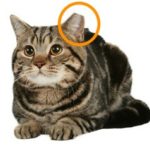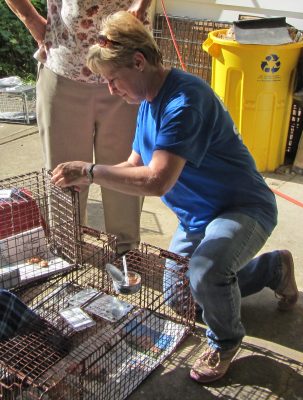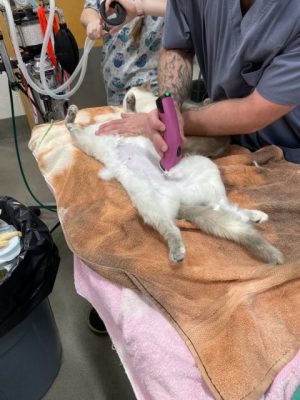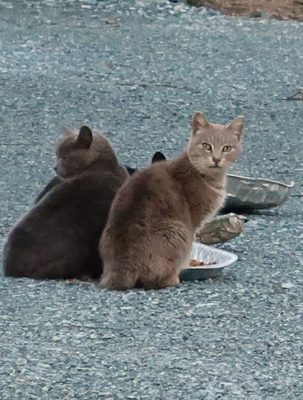About TNVR
What is TNVR?
Trap-Neuter-Vaccinate-Return (TNVR) is the nonlethal process of humanely trapping, sterilizing, vaccinating for rabies, ear-tipping and returning a free-roaming cat to its original location. Organized TNVR efforts allow for conversations within a community to determine the number of free-roaming cats in the area, development of a targeted plan to TNVR all free-roaming cats in the area and monitoring of the cats afterward by caring residents who look out for them.


Why do TNVR?
- TNVR has become the nationwide standard in addressing community cats. Prince George’s County adopted this life-saving program in February of 2020.
- TNVR helps save lives. Many community cats brought to animal shelters are not suitable indoor pets, so they are not candidates for adoption and would therefore be euthanized at the shelter. TNVR allows these cats to live out their lives in their current outdoor homes.
- If not stopped, cat reproduction is exponential. The Jason Debus Heigl Foundation reports that a staggering 420,000 kittens can be born from one female cat and her offspring in just six years.
- By reducing animal shelter admissions, TNVR reduces animal shelter admissions and reduces the shelter’s operating cost and, hence, the cost to taxpayers. It also increases shelter adoption rates, allowing shelters to save the lives of even more shelter animals!
- TNVR decreases behaviors associated with breeding such as spraying, fighting, howling and roaming.
- Fixing female cats lowers the risk of uterine infections (e.g. pyometra) and breast cancer. The fatality rate for these diseases is 90% in cats. Spaying a female before her first heat cycle offers the best protection against these diseases.
- Neutering male cats lowers their chances of getting prostrate/testicular cancers, helps decrease volatility and aggression, and reduces the urge to roam in search of a mate.
What is a feral or free-roaming cat?
The Prince George’s County Ordinance, Subtitle 3 Animal Control, defines such cats in this way:
- Ear Tipped Cat shall mean a cat that has had a straight line cutting ¼ inch off of the tip of the left ear while the cat is anesthetized. A cat who has been ear tipped indicates that it has been neutered and vaccinated.
- Feral shall mean a domesticated animal commonly kept and/or cared for as a pet existing in an unsocialized state.
- Free-roaming cat shall mean a cat that may be cared for by one or more residents of the immediate area; a free-roaming cat may or may not be feral. A free-roaming cat is not an owned animal and a person who feeds or shelters a free-roaming cat is not an owner. A free-roaming cat is not an animal at large.

Is TNVR Legal in PG County?
CB-46-2019 which went into effect on February 3, 2020, amends several provisions of the Animal Control Ordinance. It excludes free-roaming cats from the definition of “animal at large”; clarifies that free-roaming cats (and the feeding and caring for them in general) do not create a public nuisance; and establishes procedures for dealing with free-roaming cats.
Sec. 3-122. – Impounding animals; procedure.
(h) (1) Prince George’s County promotes the responsible practice of trap-neuter-return to include vaccination against rabies and other diseases as an effective method for humanely reducing the population of free-roaming cats.
(2) Free-roaming cats shall not be impounded as a public nuisance animal solely for being at large or unlicensed. The Administrator may impound a free-roaming cat if complaints to the Administrator from residents and businesses remain unresolved.
(3) An impounded free-roaming cat that has not been ear-tipped may only be redeemed to an animal care organization having experience with trap-neuter-return that has a written agreement* with the County. The agreement shall provide for rabies vaccination, sterilization and ear-tipping before the free-roaming cat may be released to the area from which it was impounded.
Is Feeding Outdoor Cats Legal?
Yes. Section 3-122 (h) (4) of the Prince George’s County Animal Control Ordinance states that “feeding, sheltering and/or otherwise caring for free-roaming cats shall not be deemed a public nuisance condition unless it disturbs the peace, comfort, or health of any person residing within the County.” To avoid such a nuisance, ensure all cats are fixed and feed cats during specific time windows only, in the most sanitary way possible. Do NOT leave food out overnight or for other extended times when it might attract rodents and other unwanted wildlife such as raccoons and coyotes.

